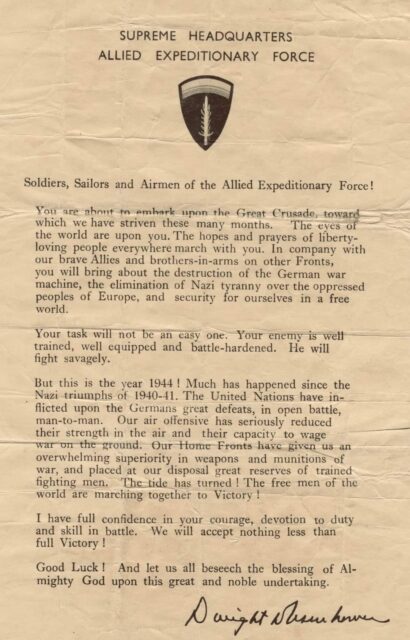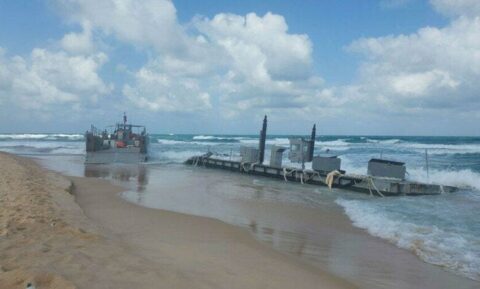FWD Publishing
Published Feb 18, 2024Lengthy documentary made in 1949 about the men and tanks of the Royal Armoured Corps (RAC).
June 9, 2024
Men In Armour (1949) – The origins and operation of tanks
June 8, 2024
Battlefield Normandy – The battles for Norrey, Bretteville & Putot
The AceDestroyer
Published Jun 27, 2019Hello, welcome to The AceDestroyer and welcome to the third and final episode of the Battlefield Normandy Series. In this episode we follow the Canadians defending Putot-en-Bessin, Bretteville-L’Orgueilleuse and Norrey-en-Bessin. In the two days of heavy combat with the 12th SS Hitlerjugend, the 7th Canadian Infantry brigade managed to hold on to all three towns. Find out how in this episode …
(more…)
QotD: Teaching military history
In addition to the low regard that military history is sometimes held in from outside of the field, there is also an odd tension in being a life-long civilian who studies and teaches on military history. It often means teaching military topics to students (or readers) who have personal military experience. I have, of course, heard it suggested that military history ought not be studied by non-veterans, or that a civilian academic simply cannot provide any useful perspective on military activity without military experience (though I should note, I have never heard that opinion expressed by someone I knew to be a combat veteran themselves). And while obviously I do not find this argument persuasive, or I wouldn’t do the job I do, I also have to admit that on a fundamental level I will always be on the civilian side of the “civilians do not understand” gap that is discussed so frequently, particularly in the experience of veterans coming home.
At the same time, in the context of the discipline of history, this complaint is patently absurd. No Roman historian has ever bought garum at the market with sestertii, nor voted in the Roman comitia centuriata, or any experienced any of a nearly infinite number of the daily activities of life in ancient Rome. The same is obviously fundamentally true of literally any history that takes place before living memory. The closest we can ever come is something like experimental archaeology, trying out historical methods and objects and while that method is an important tool, especially for the pre-modern period, it is far from the only way to do history and not necessarily the best. So of course historians study things they have no personal experience of. That’s what history is.
Teaching military history to students either bound for the military or who have military experience is actually one of the most rewarding things I have gotten to do as an academic. In this sense I have been remarkably fortunate in a lot of my teaching, which has been at large state universities in North Carolina and Florida. Both states are well above the United States population-adjusted average for the percentage of veterans in the state and I get the sense that – though I have no hard data on this (so I may be wrong) – veterans tend to matriculate through public universities at higher rates than at smaller private liberal arts college. Moreover, every university I have taught at this far has a significant ROTC program.
Consequently, I am pretty accustomed to having both veterans back from abroad in my class, as well as students who expect to commission at the end of their college experience, along with some students who are active-duty military personnel while they are taking my classes. This is especially true (no surprise) in military history classes, as one might guess. It was not uncommon, in a 45 or 55 student section of a Global Military History survey to have the complete military-career-cycle present (though of course the ROTC students would be commissioning as officers, while the active-duty and veteran students were enlisted personnel and that is a meaningful difference). Of course those students were then side-by-side with students who have no plans to ever be in the military.
It is true that there is sometimes a higher bar of “proving” yourself to the students in those situations before they begin to trust you (as anyone who so much as looks at me knows I have never served in a military), though I would note that the hardest students to reach in this regard have always been the ROTC students (rather than active duty or veteran students), who ironically have no more experience of combat than I do. At the same time, those students are choosing to be in your class because they think you have something to say on the topic and clearing the bar of “this guy knows what he’s talking about” has never been a real problem for me. If you know your business and show that you take the subject seriously, the matter resolves itself.
Bret Devereaux, “Collections: Why Military History?”, A Collection of Unmitigated Pedantry, 2020-11-13.
June 7, 2024
Battlefield Normandy – The battle of Authie D-DAY + 1
The AceDestroyer
Published Dec 20, 2018June 7, also known as D-Day +1 marked the first battle between the Canadians and the 12th SS Panzer Division Hitlerjugend during the Normandy campaign. When the Canadians attacked Authie, the German 12th SS counterattacked and a large tank on tank battle commenced. The first encounter between the two divisions was immediately a bloody one. The battle unfortunately had a barbaric end as members of the SS murdered several Canadian POW’s in cold blood. Here’s the battle of Authie.
(more…)
June 6, 2024
The reason Germany failed on D-Day (Ft. Jonathan Ferguson)
Imperial War Museums
Published Jun 5, 2024Adolf Hitler was looking forward to D-Day. His plan was simple. Reinforce the western defences, launch a furious counterattack, and “throw the Allies back into the sea”. After that, he could turn his full strength against the Soviet Union and end the war. For Hitler, the outcome of this campaign would be decisive.
In the previous episode of our D-Day series we looked at the air battle for Normandy. This time IWM Curator Adrian Kerrison covers the fighting on land. Why were some beaches bloodier than others? Why did German counterattacks fail? And why did it take so long for the Allies to breakout?
To help us answer some of those questions we’ve brought in the Royal Armouries’ Jonathan Ferguson to look at some of the most important weapons of D-Day.
(more…)
Battlefield Normandy – The Battle of Juno Beach 6 June 1944
The AceDestroyer
Published Nov 18, 2018Hello and welcome to the first episode of my Battlefield Normandy series. This part is all about the landings at Juno beach on June 6 1944, and what happened on the first day of the Allied landings in Normandy. In this episode we will take a look at all the landing beaches and the subsequent fighting. You can find the maps on my Facebook page. The next episode will be about the battle of Authie on June 7, when the Canadians first met the 12th SS Hitlerjugend. I hope you’ll enjoy this video and find it helpful.
(more…)
June 5, 2024
What Troops Ate On D-Day – World War 2 Meals & Rations
Tasting History with Max Miller
Published May 21, 2024D-Day Scrambled Eggs and Bacon served with toast and D-Day Lemonade
City/Region: United States of America
Time Period: 1944The food in the final days leading up to D-Day was a definite improvement over the sad, dry sandwiches some soldiers had been getting. All-you-can-eat meals of steak, pork chops, sides, lemon meringue pie, ice cream, and even popcorn and candy during movie screenings kept the sequestered troops well fed. The last meal served before the landing was breakfast in the very early hours of the morning, said by many to be scrambled eggs and bacon.
This meal was made in the south of England, but the bacon was from the U.S., so American-style bacon is best here. The eggs don’t taste bad, but the texture is not like fresh scrambled eggs at all (more like tofu). The bacon is real, though, and that really saves the dish. Powdered eggs can be found online and at camping stores.
No. 749. Scrambled Eggs
Water, cold … 2 1/2 quarts (2 1/2 No. 56 dippers)
Eggs, powdered … 1 1/2 pounds (1/2 3-pound can)
Salt … To taste
Pepper … To taste
Lard or bacon fat … 1 pound (1/2 No. 56 dipper)Sift eggs. Pour 1/3 of the water into a utensil suitable for mixing eggs. Add powdered eggs. Stir vigorously with whip or slit spoon until mixture is absolutely smooth. Tip utensil while stirring.
Add salt, pepper, and remaining water slowly to eggs, stirring until eggs are completely dissolved.
Melt fat in baking pan. Pour liquid eggs into hot fat.
Stir as eggs begin to thicken. Continue stirring slowly until eggs are cooked slightly less than desired for serving.
Take eggs from fire while soft, as they will continue to thicken after being removed from heat.No. 750. Diced Ham (or Bacon) and Scrambled Eggs
Add 3 pounds of ham or bacon to basic recipe for scrambled eggs; omit lard. Fry ham or bacon until crisp and brown.
Pour egg solution over meat and fat. Stir and cook as in basic recipe. Additional fat may be needed if ham is used.
— TM 10-412 US Army Technical Manual. Army Recipes by the U.S. War Department, 1946
HMCS Charlottetown: A formidable submarine-hunting force in Nato’s fleet
Forces News
Published Mar 1, 2024Conceived in the middle of the Cold War era, the Canadian Royal Navy frigate HMCS Charlottetown has evolved over three decades of service, becoming one of the most capable and adaptable ships in Canada’s navy.
After setting sail for Nato’s Exercise Steadfast Defender in the North Sea, she made a stop in Edinburgh en route to participating in the alliance’s largest training mission since the Cold War.
(more…)
June 4, 2024
Snipers in World War 1
The Great War
Published Feb 9, 2024In fall 1914, the British and French armies on the First World War’s Western Front were wrestling with a problem: unseen German riflemen were picking off any man who showed himself above the trench. Something had to be done about it – and the result was the birth of the modern sniper.
(more…)
June 2, 2024
Japan vows to fight to the end! – WW2 – Week 301 – June 01, 1945
World War Two
Published 1 Jun 2024This week President Truman and his aides meet to discuss the use of the atomic bomb. In Japan, the Imperial government vows to fight on even as Yokohama is turned to ash by firebombing. On Okinawa, Japanese 32nd Army withdraws from the defences of Shuri Castle but there is still plenty of hard fighting left for the Americans. There are US Navy command reshuffles and the stage is set for an Allied conference in Potsdam.
Chapters
01:21 Recap
05:08 The Fight on Okinawa
08:38 The Interim Committee And The Bomb
14:02 Notes
(more…)
QotD: The Spartans do not deserve the admiration of the modern US military
The Athenian historian Thucydides once remarked that Sparta was so lacking in impressive temples or monuments that future generations who found the place deserted would struggle to believe it had ever been a great power. But even without physical monuments, the memory of Sparta is very much alive in the modern United States. In popular culture, Spartans star in film and feature as the protagonists of several of the largest video game franchises. The Spartan brand is used to promote obstacle races, fitness equipment, and firearms. Sparta has also become a political rallying cry, including by members of the extreme right who stormed the U.S. Capitol on Jan. 6, 2021. Sparta is gone, but the glorification of Sparta — Spartaganda, as it were — is alive and well.
Even more concerning is the U.S. military’s love of all things Spartan. The U.S. Army, of course, has a Spartan Brigade (Motto: “Sparta Lives”) as well as a Task Force Spartan and Spartan Warrior exercises, while the Marine Corps conducts Spartan Trident littoral exercises — an odd choice given that the Spartans were famously very poor at littoral operations. Beyond this sort of official nomenclature, unofficial media regularly invites comparisons between U.S. service personnel and the Spartans as well.
Much of this tendency to imagine U.S. soldiers as Spartan warriors comes from Steven Pressfield’s historical fiction novel Gates of Fire, still regularly assigned in military reading lists. The book presents the Spartans as superior warriors from an ultra-militarized society bravely defending freedom (against an ethnically foreign “other”, a feature drawn out more explicitly in the comic and later film 300). Sparta in this vision is a radically egalitarian society predicated on the cultivation of manly martial virtues. Yet this image of Sparta is almost entirely wrong. Spartan society was singularly unworthy of emulation or praise, especially in a democratic society.
To start with, the Spartan reputation for military excellence turns out to be, on closer inspection, mostly a mirage. Despite Sparta’s reputation for superior fighting, Spartan armies were as likely to lose battles as to win them, especially against peer opponents such as other Greek city-states. Sparta defeated Athens in the Peloponnesian War — but only by accepting Persian money to do it, reopening the door to Persian influence in the Aegean, which Greek victories at Plataea and Salamis nearly a century early had closed. Famous Spartan victories at Plataea and Mantinea were matched by consequential defeats at Pylos, Arginusae, and ultimately Leuctra. That last defeat at Leuctra, delivered by Thebes a mere 33 years after Sparta’s triumph over Athens, broke the back of Spartan power permanently, reducing Sparta to the status of a second-class power from which it never recovered.
Bret Devereaux, “Spartans Were Losers”, Foreign Policy, 2023-07/22.
June 1, 2024
I plead the Pith: a History of the Pith Helmet
HatHistorian
Published Jun 1, 2022A symbol of exploration, tropical adventure, and colonialism, the pith helmet has had a long history since its origins as the salakot, a Philippine sun hat. Through many iterations, it had become one of the most famous hats out there, a powerful part of popular imagination.
The helmets I wear in this video come respectively from a gift from a family friend (so I don’t know where it was bought, https://www.historicalemporium.com/, and Amazon.com. The red tunic comes from thehistorybunker.co.uk
Title sequence designed by Alexandre Mahler
am.design@live.comThis video was done for entertainment and educational purposes. No copyright infringement of any sort was intended.
May 30, 2024
The Bloody Birth of Socialist Yugoslavia
World War Two
Published May 29, 2024In the final months of the war, Partisan leader Josip Tito and his forces complete their conquest of Yugoslavia. They destroy Draza Mihailovic’s Chetniks and Ante Pavelic’s Croatian Independent State and they outmanoeuvre King Peter. As Tito’s forces take revenge on their vanquished foes, Socialist Yugoslavia is born in a cradle of fire and blood.
02:08 Mihailovic’s Last Roll of the Dice
04:35 Tito Aligns himself with the Soviets
07:06 Albania
08:25 Tito begins state building
10:51 Hoxha purges his enemies
12:00 The Fall of Mihailović
13:08 The End of the Independent State of Croatia
14:54 The Events at Bleiburg
17:08 The Massacres
19:41 The Birth of Socialist Yugoslavia
20:54 Conclusion
(more…)
May 29, 2024
A visit to failure pier
CDR Salamander has some advice for any US congresscritter with a spine (unfortunately, that probably means none of them):
This old operational planner has one bit of advice to Congress in their role of having oversight of the Executive Branch; subpoena the Decision Brief for the Gaza pier operation.
This was on the lowest of low scale of military operations, Humanitarian Assistance/Disaster Response. There is little to nothing classified about any of this rump of a capability. Call in member of the Joint Staff who were involved in this planning — and I would prefer if you could find a few terminal O5/6 to testify as well. You might actually enjoy some candor.
The Commander’s Intent, the Higher Direction and Guidance, the Planning Assumptions, the Constraints and Restraints, the Critical Vulnerability analysis, etc. It is all there. If not, the Chairman of the Joint Chiefs of Staff and the Secretary of Defense should tell the American people to their face.
This is a larger issue than anything happening in that impossible corner of the globe. Over the weekend, we saw yet more indications of an empire in decline deteriorating from bad to pathetic.
From the time the first load came off the pier, the aid barely made it past 300 meters until it disappeared into Hamasistan.
I’ll go ahead and tap the sign;
[…]
Generally this latest act in this other-end-of-the-Med-from-the-Greeks tragedy that has unfolded in front of everyone. As we saw at the top at Ashkelon Beach, first some ancillary bits floated over to Israel as the Eastern Mediterranean reminded everyone it is at the eastern end of a big sea with weather and waves and stuff.
We then found out that three soldiers were injured in a forklift accident. Just to add insult to injury, as the locals laughed, it appears more of the business end decided to try to make it to Haifa on its own.
[…]
I’m not sure how you scatter Army property all over the Eastern Med without a boot getting dry, but maybe I’m wrong. Gaza is lava, and all.
Empires don’t often die in a blaze of glory, no. More often than not they end in simpering apologies and excuses from poor leaders putting the wrong people in positions they have no place being, and when they fail — there is no accountability.






